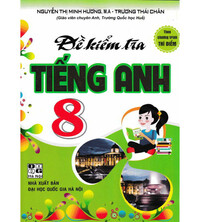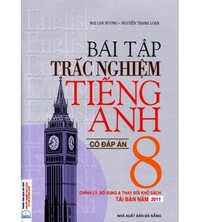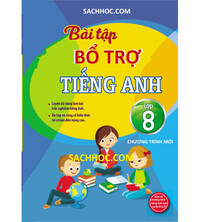Tiếng Anh 8 Unit 2 Reading: The importance of smell
THINK! What smells can you remember from when you were younger? Is there a connection between smells and memory? 1. Read the article. Then complete the headings for paragraphs A-C with the words in the box. 2. Read and listen to the article again and write true or false. Correct the false sentences. 3. Find synonyms in the text for the words below. 4. VOCABULARY PLUS. Use a dictionary to check the meaning of the words in blue in the text.
Think!
THINK! What smells can you remember from when you were younger? Is there a connection between smells and memory?
(HÃY NGHĨ! Mùi gì bạn có thể nhớ từ khi bạn còn bé hơn? Có mối liên hệ nào giữa mùi hương và trí nhớ không?)
Lời giải chi tiết:
I can remember the smell of the sweet potato cakes my grandmother made when I was younger. Yes, there is a connection between smells and memory. I think smells and memory seem to be so closely linked because of the brain's anatomy.
(Tôi có thể nhớ mùi thơm của những chiếc bánh khoai lang mà bà tôi làm khi tôi còn nhỏ. Vâng, có một mối liên hệ giữa mùi hương và ký ức. Tôi nghĩ rằng mùi hương và trí nhớ dường như có mối liên hệ chặt chẽ với nhau do cấu trúc của bộ não.)
Bài 1
1. Read the article. Then complete the headings for paragraphs A-C with the words in the box.
(Đọc bài viết. Sau đó hoàn thành các tiêu đề cho các đoạn A-C với các từ trong hộp.)
|
distance food memory nose smell |
A. Scent and …
B. Training a …
C. Life without ...
Follow your nose...
Meet three people whose sense of smell has made a difference to their lives.
A. Helen Keller - a famous activist - was deaf and blind herself. With an extraordinary sense of smell, she could identify people's jobs by the odour on their clothes. ‘When a person passes’, she said, 'I get a scent impression of where he has been’. For her, a smell can remind us of another time and place.
B. James Bell has worked for a perfume company for over twenty years. He says, 'To develop a superior sense of smell, you must train it, like a concert pianist’. After passing a 'smell test', James studied perfumery in France, where he learned to recognise about 2,800 synthetic and 140 natural materials. Since then he has helped to create the world's favourite fragrances.
C. Journalist Lucy Mangan has been anosmic since birth. So she can't smell anything, even the fragrances of roses. She has never tried different perfumes in a shop. As 75-95% of the food flavour comes from its smell, meals haven't had much flavour. Although she can feel the different textures of lasagne, steak or fish, they're all quite tasteless.
Phương pháp giải:
Tạm dịch:
Theo dõi mũi của bạn ...
Gặp gỡ ba người mà khứu giác đã tạo nên sự khác biệt cho cuộc sống của họ.
A. Helen Keller - một nhà hoạt động nổi tiếng – khiếm thính và khiếm thị. Với khứu giác siêu phàm, cô có thể xác định công việc của mọi người qua mùi trên quần áo của họ. “Khi một người đi qua”, cô ấy nói, “tôi có ấn tượng về mùi hương của nơi anh ta đã đến”. Đối với cô ấy, một mùi hương có thể nhắc nhở chúng ta về thời gian và địa điểm khác.
B. James Bell đã làm việc cho một công ty nước hoa hơn 20 năm. Ông ấy nói, “Để phát triển khứu giác vượt trội, bạn phải huấn luyện nó, giống như một nghệ sĩ piano hòa nhạc. Sau khi vượt qua “bài kiểm tra mùi hương”, James đã học ngành nước hoa ở Pháp, nơi ông ấy học cách nhận biết khoảng 2.800 nguyên liệu tổng hợp và 140 nguyên liệu tự nhiên. Kể từ đó, ông đã giúp tạo ra những loại nước hoa được yêu thích trên thế giới.
C. Journalist Lucy Mangan đã bị dị tật kể từ khi sinh ra. Vì vậy, cô ấy không thể ngửi thấy bất cứ thứ gì, ngay cả hương thơm của hoa hồng. Cô ấy chưa bao giờ thử các loại nước hoa khác nhau trong một cửa hàng. Vì 75-95% hương vị thực phẩm đến từ mùi của nó nên bữa ăn không có nhiều hương vị. Mặc dù cô ấy có thể cảm nhận được kết cấu khác nhau của món mì lasagne, bít tết hoặc cá, nhưng tất cả chúng đều khá vô vị.
Lời giải chi tiết:
|
A. memory |
B. nose |
C. smell |
A. Scent and memory (Hương thơm và ký ức / kỷ niệm)
B. Training a nose (Huấn luyện mũi)
C. Life without smell (Cuộc sống không có mùi hương)
Bài 2
2. Read and listen to the article again and write true or false. Correct the false sentences.
(Đọc và nghe lại bài viết và viết đúng hoặc sai. Sửa các câu sai.)
1. Helen Keller had a good sense of smell.
2. She says there's a connection between smells and memory.
3. A person with a normal sense of smell can become a professional perfumer.
4. James Bell failed his first 'smell test' at the perfume company.
5. Lucy could smell everything when she was a baby.
Lời giải chi tiết:
|
1. T |
2. T |
3. F |
4. F |
5. F |
1. T
Helen Keller had a good sense of smell.
(Helen Keller có khứu giác tốt.)
Thông tin: With an extraordinary sense of smell, she could identify people's jobs by the odour on their clothes.
(Với khứu giác siêu phàm, cô có thể xác định công việc của mọi người qua mùi trên quần áo của họ.)
2. T
She says there's a connection between smells and memory.
(Cô ấy nói có mối liên hệ giữa mùi hương và ký ức.)
Thông tin: For her, a smell can remind us of another time and place.
(Đối với cô ấy, một mùi có thể nhắc nhở chúng ta về thời gian và địa điểm khác.)
3. F
A person with a normal sense of smell can become a professional perfumer.
(Một người có khứu giác bình thường có thể trở thành chuyên gia chế tạo nước hoa chuyên nghiệp.)
Thông tin: He says, 'To develop a superior sense of smell, you must train it, like a concert pianist’.
(Anh ấy nói, 'Để phát triển khứu giác vượt trội, bạn phải huấn luyện nó, giống như một nghệ sĩ piano trong buổi hòa nhạc'.)
Sửa lại: normal => superior
A person with a superior sense of smell can become a professional perfumer.
(Một người có khứu giác siêu phàm có thể trở thành chuyên gia chế tạo nước hoa chuyên nghiệp.)
4. F
James Bell failed his first 'smell test' at the perfume company.
(James Bell đã thất bại trong 'bài kiểm tra mùi hương' đầu tiên tại công ty nước hoa.)
Thông tin: After passing a 'smell test', James studied perfumery in France, where he learned to recognise about 2,800 synthetic and 140 natural materials.
(Sau khi vượt qua 'bài kiểm tra mùi', James đã học ngành nước hoa ở Pháp, nơi anh học cách nhận biết khoảng 2.800 nguyên liệu tổng hợp và 140 nguyên liệu tự nhiên.)
Sửa lại: failed => passed
James Bell passed his first 'smell test' at the perfume company.
(James Bell đã vượt qua trong 'bài kiểm tra mùi' đầu tiên tại công ty nước hoa.)
5. F
Lucy could smell everything when she was a baby.
(Lucy có thể ngửi thấy mọi thứ khi cô còn bé.)
Thông tin: Journalist Lucy Mangan has been anosmic since birth. So she can't smell anything, even the fragrances of roses.
(Nhà báo Lucy Mangan đã bị dị tật kể từ khi sinh ra. Vì vậy, cô ấy không thể ngửi thấy bất cứ thứ gì, ngay cả hương thơm của hoa hồng.)
Sửa lại: could => couldn’t
Lucy couldn’t smell everything when she was a baby.
(Lucy không thể ngửi thấy mọi thứ từ khi cô còn bé.)
Bài 3
3. Find synonyms in the text for the words below.
(Tìm từ đồng nghĩa trong văn bản cho các từ dưới đây.)
1. incredible
2. identify
3. artificial
4. organic
Lời giải chi tiết:
1. incredible = extraordinary (lạ thường, không thể tin được)
2. identify = recognise (nhận ra)
3. artificial = synthetic (nhân tạo)
4. organic = natural (tự nhiên)
Bài 4
4. VOCABULARY PLUS. Use a dictionary to check the meaning of the words in blue in the text.
(Từ vựng bổ sung. Sử dụng từ điển để kiểm tra nghĩa của các từ màu xanh lam trong văn bản.)
Lời giải chi tiết:
1. odour (n): mùi
2. scent (n): mùi thơm
3. perfume (n): nước hoa
4. fragrances (n): hương liệu
5. flavor (n): mùi vị
6. textures (n): kết cấu
Bài 5
5. USE IT! Talk about which objects and places smell best to you. Which of them bring back memories?
(Hãy nói về những đồ vật và địa điểm có mùi hương tuyệt nhất đối với bạn. Cái nào trong số chúng mang lại những kỷ niệm?)
Example: I love the smell of bánh xèo. It really reminds me of my grandma's house. It brings back memories of visiting her house when I was little.
(Tôi yêu mùi bánh xèo. Nó thực sự làm tôi nhớ đến ngôi nhà của bà tôi. Nó mang lại những kỷ niệm về thăm nhà cô ấy khi tôi còn nhỏ.)
Lời giải chi tiết:
I love the smell of the rain. It always reminds me of my childhood when I played in the rain with my friends.
(Tôi yêu mùi của cơn mưa. Nó luôn nhắc tôi nhớ về tuổi thơ của mình khi mà tôi từng tắm mưa với bạn bè.)
I love the smell of ripe rice. It brings back memories of my hometown.
(Tôi yêu mùi lúa chín. Nó mang lại những kỷ niệm về quê hương của tôi.)
Search google: "từ khóa + timdapan.com" Ví dụ: "Tiếng Anh 8 Unit 2 Reading: The importance of smell timdapan.com"







